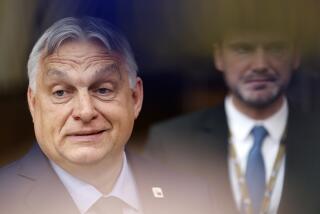Regional Outlook : Drinking a Toast to Europe’s Future : Leaders of 34 nations will meet in Paris next week. Times correspondents in key capitals report on their hopes and fears for the Continent.
- Share via
BUDAPEST — The adolescent democracies of Eastern Europe have cast the CSCE in the role of a foster parent, hoping for protection and sustenance until they are strong enough to fend for themselves.
While their dependence on the 34-nation alliance reflects a level of trust crucial to a European family of nations, the states of Eastern Europe have a record of inter-ethnic strife that will also confront CSCE with one of its biggest challenges in preserving the peace.
Eastern Europe’s collective throwing off of dictatorial rule last year tore down the ideological barriers that divided the Continent for half a century. But in the vacuum created by the collapse of the Iron Curtain, the facade of unity among peoples of the Warsaw Treaty Organization has also crumbled, revealing simmering nationalist disputes between Hungarians and Romanians, Serbs and Croats, Bulgars and Turks, Czechs and Slovaks.
A major test of the region’s dedication to an allied Europe may be the willingness of individual states to abide by CSCE guidance on how to resolve these confrontations.
Meanwhile, newly elected political leaders are counting on trade and financial aid from partners in the CSCE to ease the poverty and backwardness at the root of their ethnic conflicts. Also, Moscow’s former wards are counting on a stable and more symbiotic Europe to free up funds, once destined for regional defenses, to rebuild industry and clean the environment.
Disarmament is a high-stakes gamble for the small and financially strapped nations, as the Warsaw Pact that has protected them for 35 years is effectively defunct, while NATO remains militarily strong and politically united.
Eastern Europe’s willingness to be exposed militarily while redirecting resources to improve the economy may be the best guarantee of its peaceful intentions and support for a pan-European defense force under the CSCE.
When the foreign ministers of the six surviving Warsaw Pact states gathered in Budapest in early November, Hungarian Foreign Minister Geza Jeszenszky summed up the significance of the weapons cuts they had agreed to.
“Reduction of arms won’t solve the economic problems of this region,” Jeszenszky said, “but without it the problems of this region would be unresolvable.”
More to Read
Sign up for Essential California
The most important California stories and recommendations in your inbox every morning.
You may occasionally receive promotional content from the Los Angeles Times.














